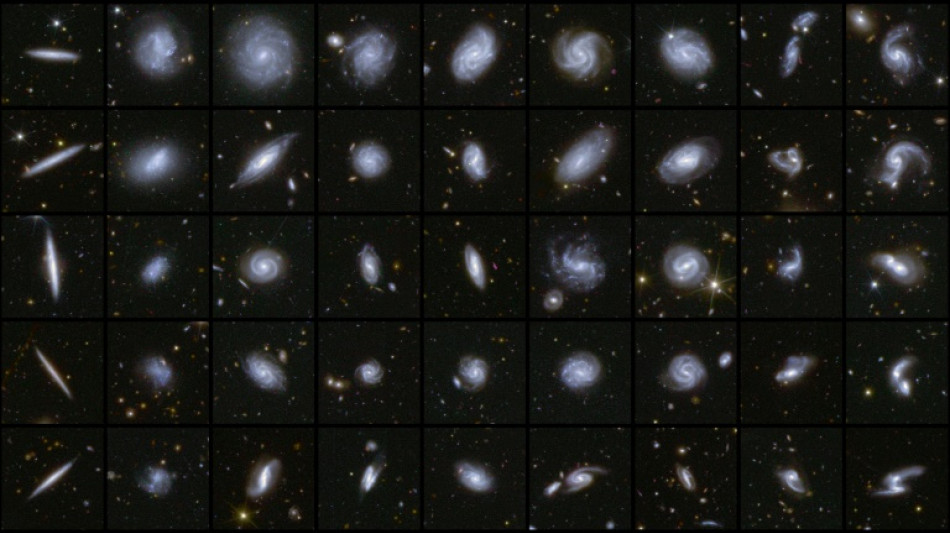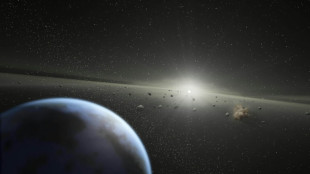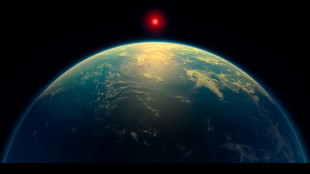
-
 Migrant's expulsion puts Washington Salvadorans on edge
Migrant's expulsion puts Washington Salvadorans on edge
-
Plan for expanded Muslim community triggers hope, fear in Texas

-
 Pakistan foreign minister due in Kabul as deportations rise
Pakistan foreign minister due in Kabul as deportations rise
-
White House touts Covid-19 'lab leak' theory on revamped site

-
 Dodgers star Ohtani skips trip to Texas to await birth of first child
Dodgers star Ohtani skips trip to Texas to await birth of first child
-
US senator says El Salvador staged 'margarita' photo op

-
 Ford 'adjusts' some exports to China due to tariffs
Ford 'adjusts' some exports to China due to tariffs
-
Thomas maintains two-shot lead at RBC Heritage

-
 US to withdraw some 1,000 troops from Syria
US to withdraw some 1,000 troops from Syria
-
Four killed after spring storms wreak havoc in the Alps

-
 Spurs' Popovich reportedly home and well after 'medical incident'
Spurs' Popovich reportedly home and well after 'medical incident'
-
Trump goes to war with the Fed

-
 Celtics chase second straight NBA title in playoff field led by Thunder, Cavs
Celtics chase second straight NBA title in playoff field led by Thunder, Cavs
-
White House site blames China for Covid-19 'lab leak'

-
 Norris edges Piastri as McLaren top Jeddah practice
Norris edges Piastri as McLaren top Jeddah practice
-
Trump warns US could ditch Ukraine talks if no progress

-
 Judge denies Sean 'Diddy' Combs push to delay trial
Judge denies Sean 'Diddy' Combs push to delay trial
-
80 killed in deadliest US attack on Yemen, Huthis say

-
 Lebanon says two killed in Israeli strikes in south
Lebanon says two killed in Israeli strikes in south
-
Trump says US will soon 'take a pass' if no Ukraine deal

-
 F1 success is 'like cooking' - Ferrari head chef Vasseur
F1 success is 'like cooking' - Ferrari head chef Vasseur
-
Cycling mulls slowing bikes to make road racing safer

-
 Macron invites foreign researchers to 'choose France'
Macron invites foreign researchers to 'choose France'
-
Klopp 'happy' in new job despite Real Madrid rumours: agent

-
 Alcaraz into Barcelona semis as defending champion Ruud exits
Alcaraz into Barcelona semis as defending champion Ruud exits
-
Vance meets Italy's Meloni before Easter at the Vatican

-
 Evenepoel returns with victory in Brabantse Pijl
Evenepoel returns with victory in Brabantse Pijl
-
Maresca confident he will survive Chelsea slump

-
 Mob beats to death man from persecuted Pakistan minority
Mob beats to death man from persecuted Pakistan minority
-
Lebanon says one killed in Israeli strike near Sidon

-
 Arsenal's Havertz could return for Champions League final
Arsenal's Havertz could return for Champions League final
-
US officials split on Ukraine truce prospects

-
 Client brain-dead after Paris cryotherapy session goes wrong
Client brain-dead after Paris cryotherapy session goes wrong
-
Flick demands answers from La Liga for 'joke' schedule

-
 'Maddest game' sums up Man Utd career for Maguire
'Maddest game' sums up Man Utd career for Maguire
-
Trial opens for students, journalists over Istanbul protests

-
 Gaza rescuers say Israeli strikes kill 24 after Hamas rejects truce proposal
Gaza rescuers say Israeli strikes kill 24 after Hamas rejects truce proposal
-
'Really stuck': Ukraine's EU accession drive stumbles

-
 'Not the time to discuss future', says Alonso amid Real Madrid links
'Not the time to discuss future', says Alonso amid Real Madrid links
-
74 killed in deadliest US attack on Yemen, Huthis say

-
 Southgate's ex-assistant Holland fired by Japan's Yokohama
Southgate's ex-assistant Holland fired by Japan's Yokohama
-
Vance meets Meloni in Rome before Easter at the Vatican

-
 Ryan Gosling to star in new 'Star Wars' film
Ryan Gosling to star in new 'Star Wars' film
-
Hamas calls for pressure to end Israel's aid block on Gaza

-
 Russia says Ukraine energy truce over, US mulls peace talks exit
Russia says Ukraine energy truce over, US mulls peace talks exit
-
58 killed in deadliest US strike on Yemen, Huthis say

-
 Museums rethink how the Holocaust should be shown
Museums rethink how the Holocaust should be shown
-
Three dead after deadly spring storm wreaks havoc in the Alps

-
 No need for big changes at Liverpool, says Slot
No need for big changes at Liverpool, says Slot
-
Bloody Philippine passion play sees final performance of veteran 'Jesus'


'Dark universe detective' telescope releases first data
Europe's Euclid space telescope, which is on a mission to shed light on the mysteries of dark matter and dark energy, released its first data Wednesday with a little help from volunteers and artificial intelligence.
The telescope launched in 2023, aiming to chart one third of the sky -- encompassing 1.5 billion galaxies -- to create what has been billed as humanity's most accurate 3D map of the universe.
Euclid, which is now hovering 1.5 million kilometres (932,0000 miles) from Earth, has previously released images of a range of strange galaxies, colourful nebulas and shining stars.
But the first release of astronomical data is "a new milestone for our dark universe detective," the European Space Agency's science director Carole Mundell told a press conference.
The huge amount of data -- which was accompanied by 27 scientific papers -- still only covers less then 0.5 percent of the sky that Euclid will scan over its six-year mission.
- Snagging the 'cosmic web' -
Yet the early data already offers hints about the overall structure of the universe known as the "cosmic web," project scientist Valeria Pettorino said.
Between large empty spaces, there are massive clusters of galaxies connected by filaments of material which make up this web, she explained.
This unimaginably massive structure cannot be explained by visible matte alone, so scientists believe dark matter and dark energy must play a role.
These invisible forces are thought to make up 95 percent of the universe yet remain shrouded in mystery.
Dark matter is believed to be the glue that holds galaxies together, while dark energy pulls them apart by making the universe expand faster and faster over time.
Because looking into distant space also means looking back in time, Euclid allows scientists to track this cosmic tussle over most of the history of the universe -- and hopefully discover more about their true nature.
"Ultimately, we want to test the laws of gravity," Mundell said.
Einstein's theory of relativity has passed every test thrown at it, "but it does not yet, in its current form, explain the accelerated expansion of the universe", which is driven by dark energy, she explained.
However the new data did not contain any major revelations about dark matter and dark energy. That will have to wait until closer to the end of Euclid's mission, the scientists said.
- Capturing the galactic zoo -
The Euclid Consortium, which brings together more than 2,000 researchers from Europe, the United States, Canada and Japan, sorted through the new data.
Wednesday's release contained 35 terabytes of data -- the equivalent of streaming 4K video for 200 days -- yet represented just a week of Euclid's observation time.
This "allows to us see whether the machinery is working", the consortium's deputy scientific director Francis Bernardeau told AFP.
The new data covered three areas of the sky containing 26 million galaxies.
The most distant was 10.5 billion light years away, which is fairly early on in the 13.8 billion-year history of the universe.
The consortium then had to catalogue all the galaxies, quasars and other cosmic oddities captured by the telescope.
This includes what are known as gravitational lenses, which is when a massive object such as a galaxy bends the light of something else huge and bright behind it, creating a kind of magnifying glass.
In just a week, Euclid spotted around 500 gravitational lenses, which is "way more than we expected," said consortium member Mike Walmsley from the University of Toronto.
To help crunch the data, the Euclid consortium used an artificial intelligence (AI) algorithm as well as more than 10,000 keen-eyed human volunteers.
The AI model selected possible gravitational lenses from the data, which were then verified by humans.
More citizens scientists then identified the shapes of the galaxies, which was in turn used to train the AI algorithms to repeat this process, Walmsley said.
But this is all just "a taste of things to come", Mundell added, with Euclid planned to release its first full catalogue of data next year.
N.Schaad--VB



